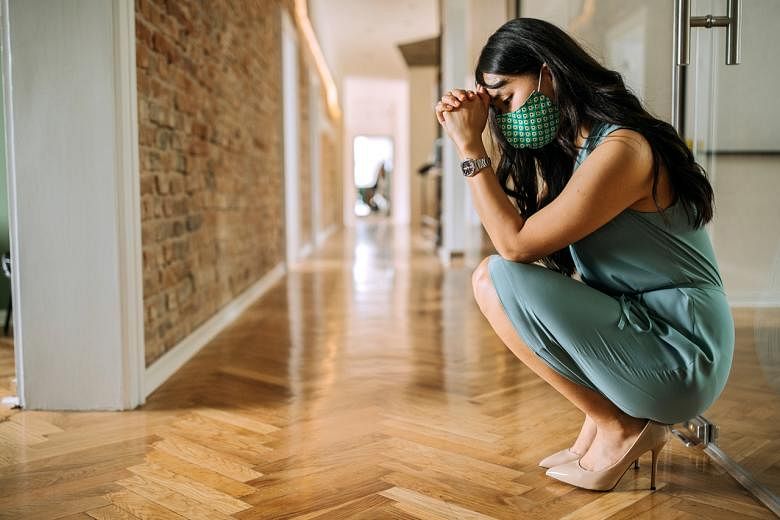SINGAPORE - When Ms P. Lim, 32, returned to the office last week after working from home for about a year, she found it hard to adjust.
It was difficult to start conversations with her colleagues and she preferred going for lunch alone, which was not the case before.
The marketing and sales executive, who now has to work three days a week in office, had become comfortable with weekly meetings via video conferencing and was not looking forward to "unnecessary small talk".
Ms Lim, who would give only her initials, says: "It feels like I have to rewire my brain into understanding this new normal all over again. I felt tense and uncomfortable in getting used to a different setting, with my bosses and colleagues around me, compared with when I was working alone at home."
Like Ms Lim, some people are feeling anxious or stressed as they start going back to work regularly in the office.
It was announced on March 24 that up to 75 per cent of employees may return to the workplace at any one time from April 5, up from 50 per cent. However, an online poll by The Sunday Times published on March 28 found that three in four of nearly 2,600 respondents did not wish to return to the office.
The reopening of workplaces could cause re-entry anxiety, says Mr Chad Yip, a clinical psychologist for Noah and Zoey, which are digital health platforms for men and women.
Re-entry anxiety occurs when people experience higher levels of anxiety and stress in response to the fear of changes. In this case, people worry about what will happen when they step out of their homes more often, return to the workplace and socialise.
Mr Yip has seen a 20 per cent increase in patients with such anxiety since last month.
Dr Felicia Neo, director and clinical psychologist at Neo Cooper Psychology Clinic, says: "As more and more employees are asked to return to the workplace with increasing hours, many may view this as a break in the structure, regimen and normality that they have learnt to create in the environments they have set up for themselves over the past year."
Apart from disrupting the routine that people have grown used to working from home, Dr Neo notes that many could feel anxious and confused returning to the workplace with new Covid-19 rules and restrictions to adhere to.
Besides anxiety, she says the return to office can also cause an adjustment disorder, in which one feels more emotionally distressed than normal in response to an unexpected or a stressful event.
"This is because people may feel pressured to readjust back to the old norm, after having been accustomed to working from home for a year or more," she adds.
Symptoms of an adjustment disorder include lack of participation in meetings; social withdrawal and isolation in workplace gatherings; absenteeism from work; feelings of fear and helplessness; and appearing more anxious, temperamental and angry.
It may take up to three months for symptoms to develop after a person is exposed to a stressful situation, says Mr Yip.
These symptoms are likely to affect productivity, as a person might have problems managing and focusing on tasks even though he is present in the office.
"People will tend to be more disengaged from work and encounter difficulties interacting with colleagues or meeting deadlines," he adds.
Dr Annabelle Chow, principal clinical psychologist at Annabelle Psychology, says such behaviour may cause people to doubt their capabilities and have reduced confidence in their skills.
This was the case for Mr Seck, a marketing coordinator, who last week started going back to work in the office twice a week.
The 29-year-old, who declines to share his full name, says he did not feel as confident as he used to when he had to present at meetings. He also felt less productive and found it tough to focus on work, "possibly due to the change in environment".
"I think it may improve with time, but at the start, it can be a bit overwhelming to adjust to this hybrid work arrangement," he adds.
To take better care of one's mental health, Dr Chow suggests that people take some time during the day to pen down overwhelming thoughts. "By doing so, you allow yourself to prioritise your worries and be aware of what can be controlled," she says.
Mr Yip adds that bosses should check in with employees to understand how they are coping, as it encourages open conversations and allows for warning signs of emotional distress to be identified.
Dr Neo urges people to recognise their feelings and seek help if needed.
"Consider this perspective: If you were to have a fever, you would not dismiss it and would take active steps to address it. Similarly, if you are experiencing anxiety and emotional distress, do not dismiss this as nothing, but take active steps to address it," she says.
8 ways to care for your mental health
1. LISTEN TO YOUR BODY
The first step is to recognise stress and anxiety when you experience them.
Allow yourself to notice your emotions even if they are negative. The more you suppress and resist them, the more they will work against you.
Recognise what your triggers and problem areas are. For example, recognise why you feel happy about something. Emotions exist for a reason.
2. ACCEPT THAT IT IS OKAY TO FEEL THIS WAY
Adjusting to a new norm can be difficult. With regard to work performance, there may be expectations from yourself and your superiors to do well.
These feelings and thoughts can be challenging to deal with. But remember that it is okay to feel vulnerable in such a situation and try not to be too harsh on yourself.
3. TAKE BABY STEPS TO DEVELOP NEW HABITS
Set small steps that could help you overcome your anxiety, such as taking public transport to work during non-peak hours.
These can help you regain some sense of control and confront your sources of anxiety.
4. ESTABLISH A NEW ROUTINE AND STICK TO IT
Having a routine will give you comfort and a sense of control in stressful situations. Give yourself some time to adjust to the new situation and form a new routine, which can ease your anxiety.
You may want to engage in activities such as mindfulness and deep breathing exercises, which can reduce stress.
Consider starting the day with a simple activity like taking deep breaths, stretching or having breakfast.
5. DOCUMENT YOUR THOUGHTS
Journaling can have positive health benefits. Give yourself 10 minutes a day to write down all your thoughts.
This can help you gain perspective, clarity and understand your thoughts and emotions better.
6. STAY CONNECTED TO LOVED ONES
Avoid using the pandemic as an excuse to distance yourself from your loved ones.
Use technology to keep in touch with friends and family, such as through voice calls, video conferencing, messaging or e-mails.
7. TAKE CARE OF YOUR PHYSICAL HEALTH
Engaging in physical exercise and having a healthy and well-balanced diet as well as seven to nine hours of quality sleep can improve psychological functioning and moods.
8. SEEK HELP IF THINGS GET OVERWHELMING
Try to seek support from family, friends and trusted colleagues as much as possible.
You can also approach your general practitioner, who can provide medical advice and a referral to a mental health provider.
There is also the option of online counselling, where you can speak with a professional to learn to be more in tune with your emotions and take charge of your mental well-being in a safe, private and confidential setting.
Sources: Mr Chad Yip, clinical psychologist for Noah and Zoey, digital health platforms for men and women; and Dr Felicia Neo, director and clinical psychologist at Neo Cooper Psychology Clinic


